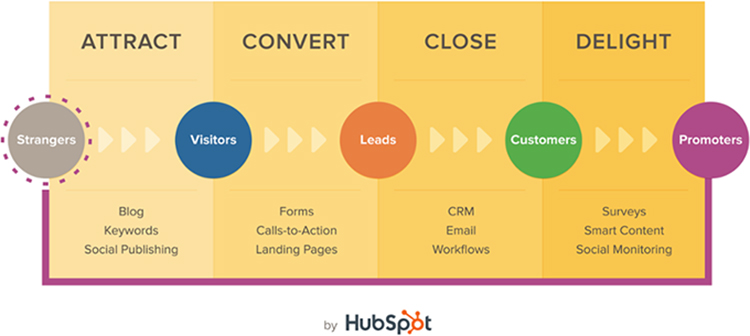Over the past 5 years the term “Inbound Marketing” has been rapidly growing in popularity.
The term Inbound Marketing is credited to being first coined by Hubspot’s co-founder and CEO Brian Halligan, during the company’s inception back in 2006. Hubspot are the developers of one of the leading content marketing platforms for business of all sizes – a platform we at LeadDigital are committed to using ourselves and one we know to be beneficial to hospitality businesses such as event venues, bars, restaurants and hotels.
Inbound marketing describes the marketing strategy of attracting customers through digital content and interactions to your website. However, you may be more familiar associating this description with the term content marketing. You aren’t wrong! Content marketing is the process of attracting prospects to your website through a variety of content formats, like video, case studies, infographics, etc. However, inbound goes beyond this.
Arguably, content marketing has been incorporated as a part, or subset, of inbound. Content marketing only covers the initial stage of attracting potential customers within the inbound methodology as you can see from the graphic below.

Inbound Methodology
The above graphic represents Hubspot’s Inbound Methodology. It is made up of four actions, along the top (Attract, Convert, Close, Delight), which companies must take in order to obtain visitors, leads, customers and promoters. Along the bottom are the tools companies use to accomplish these actions. It is important to note these tools are listed under the action where they first come into play. Tools, like email, can play a big role in several stages of the inbound methodology.
The overall practice focuses on turning strangers into customers and customers into evangelists of your brand. Here is a quick summary of each stage of the inbound methodology, with reference to the above graphic;
Attract
Potential customers discover your hospitality brand through content such as blogs, videos and reviews via social media publishing and search engines. This content needs to aim at providing helpful information and answer questions. These are questions you know your potential customers will have when researching and booking a hotel, event venue, or table at your restaurant, for example.
This stage of the practice relies on a strong understanding of search engine optimisation and content creation skills. It also requires a good understanding of your customer base and an ability to pick out characteristics of your ideal customers. See more on how inbound can help your hospitality business increase sales.
Convert
Having successfully attracted potential customers to your site, this is where you make your website work for you. Using a combination of Call To Action buttons, Landing Pages and Forms, you capture the details of your potential customers, turning them into enquiries (leads).
Close
This is where having a good CRM (customer relationship management) system, that keeps a record of all customer interactions, really supports you in turning an enquiry into a customer. Email also plays an important role at this stage as a form of drip marketing, which nurtures your prospective guests and encourages them into becoming customers. An email marketing platform, like Hubspot’s or MailChimp, can automate much of this process while providing a customised experience (see point 5 in Why Your Hospitality Email Marketing isn’t Working!).
Delight
Continually using your CRM system to manage communications with existing customers. You can utilise email and initiate social monitoring to connect with your customer, provide excellent service and keep your brand top-of-mind. It is during this stage where delighting your customer also turns them into an evangelist of your hospitality brand.
Conclusion
Inbound begins with the principles of content marketing and utilises other tools and disciplines, which you may already be familiar with, to generate qualified leads, increase sales and convert customers into promoters.
We at LeadDigital work with hospitality businesses to establish and manage inbound marketing strategies, which deliver high quality enquiries and increase bookings.
If you’d like to attract more guests to your website and increase the volume of repeat business, then click below!



